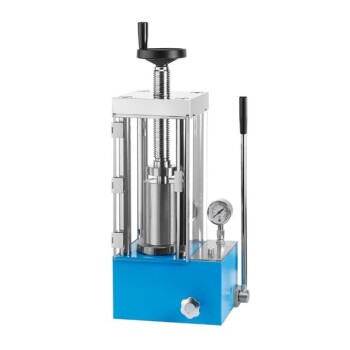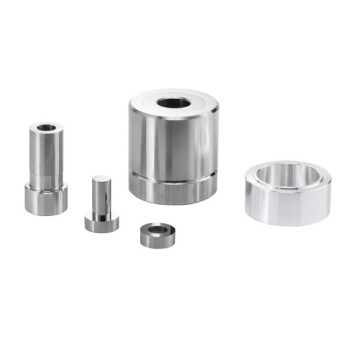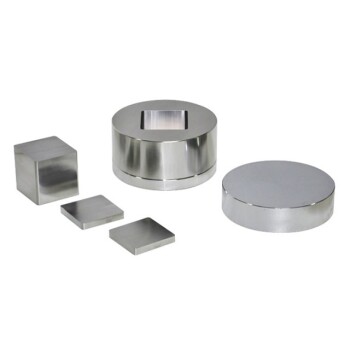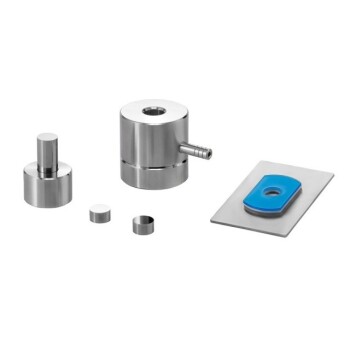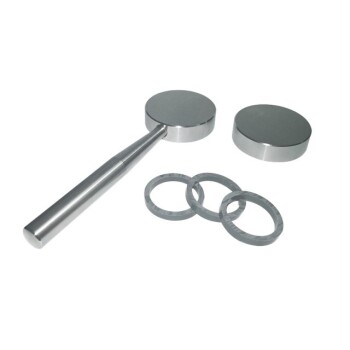At their core, screw presses are defined by their remarkable precision, mechanical simplicity, and inherent robustness. Unlike automated or hydraulic systems that apply force quickly, a screw press configuration allows for a highly controlled, gradual application of pressure. This makes it the preferred tool for applications where sample integrity and repeatability are paramount, particularly in analytical laboratory settings.
The primary advantage of a screw press lies not in its power, but in its precision. It is engineered for applications where consistent, repeatable sample preparation is more critical than sheer force, making it an indispensable tool in sensitive analytical work.

The Principle: Translating Rotation into Linear Force
The unique characteristics of a screw press stem directly from its fundamental mechanism. By turning a screw, rotational motion is converted into precise, linear motion, which generates compressive force.
The Mechanics of Control
The design of the screw thread is the key to its precision. A fine thread pitch means that a significant rotation of the handle results in a very small amount of linear travel.
This mechanical advantage allows the operator to apply and increase pressure in minute, controlled increments, preventing the shock and sudden force that can damage brittle samples.
Tactile Feedback and Operator Input
Manual screw presses provide direct, tactile feedback. The operator can literally feel the material compacting and resisting the pressure.
This feedback loop is invaluable when working with delicate materials, allowing the user to adjust the force in real-time to avoid cracking a sample pellet—a common issue with less controllable press types.
Inherent Simplicity and Robustness
A screw press is a simple machine with few moving parts. There are no hydraulic fluids to leak, no complex seals to fail, and no intricate electronics to calibrate or repair.
This minimalist design directly translates to exceptional reliability and low maintenance, ensuring high uptime and a low total cost of ownership in a busy lab environment.
Key Features in Application
These core principles give the screw press distinct advantages in specific contexts, most notably in preparing samples for spectroscopic analysis.
Unmatched Control for Sample Integrity
Techniques like FTIR spectroscopy and XRF analysis rely on samples being prepared in a uniform, homogenous pellet.
A screw press enables the operator to slowly evacuate air and gradually compact the powder. This methodical approach is critical for creating a transparent, solid KBr pellet for FTIR or a durable, flat pellet for XRF, ensuring accurate and repeatable analytical results.
Adaptability Across Materials
The slow, controlled application of force makes the screw press highly adaptable. It can handle a wide range of materials, from brittle crystalline powders to more pliable substances.
The operator can tailor their technique based on the material's feedback, something that is difficult to achieve with a pre-programmed automated press.
Understanding the Trade-offs
Despite its advantages in precision, a screw press is not the ideal solution for every task. Objectivity requires acknowledging its limitations.
Limited Maximum Force
The force a screw press can generate is ultimately limited by its mechanical design and the physical strength of the operator.
These presses are not designed for high-tonnage industrial applications like metal forming or large-scale compaction. Their strength is finesse, not brute force.
Low Throughput and Manual Operation
A screw press is a manual, single-sample tool. The process is inherently methodical and time-consuming compared to automated systems.
For this reason, it is not suitable for high-volume production lines where speed and throughput are the primary concerns.
Dependence on Operator Skill
While tactile feedback is an advantage, it also introduces a variable: the operator. Achieving perfect consistency across different users requires training and a developed "feel" for the process.
An inexperienced operator may still over-pressurize and crack a sample, whereas an automated system can offer repeatable force parameters, albeit with less nuance.
Making the Right Choice for Your Goal
To select the right tool, you must align its features with your primary objective.
- If your primary focus is analytical precision: A screw press offers the tactile feedback and gradual pressure control needed to create consistent, high-quality samples for techniques like FTIR or XRF.
- If your primary focus is reliability and low operational cost: The simple mechanical design of a screw press ensures minimal downtime and virtually no maintenance, making it a dependable workhorse.
- If your primary focus is high-tonnage force or production volume: You should consider a hydraulic or fully automated press, as a screw press is not designed for these industrial-scale tasks.
Ultimately, choosing a screw press is a decision to prioritize control and consistency over raw power.
Summary Table:
| Feature | Benefit | Ideal For |
|---|---|---|
| Fine thread pitch | Precise, gradual pressure application | Preventing sample damage in delicate materials |
| Tactile feedback | Real-time force adjustment by operator | Handling brittle or sensitive samples |
| Mechanical simplicity | High reliability and low maintenance | Busy lab environments with minimal downtime |
| Controlled force | Consistent, repeatable sample preparation | FTIR and XRF spectroscopy analysis |
| Manual operation | Adaptability across various materials | Low-volume, high-precision tasks |
Upgrade your laboratory's sample preparation with KINTEK's precision screw presses! Our lab press machines, including automatic lab presses, isostatic presses, and heated lab presses, are designed to deliver unmatched control and reliability for sensitive analytical work like FTIR and XRF. Experience enhanced sample integrity, reduced maintenance, and consistent results tailored to your lab's needs. Contact us today to discuss how KINTEK can support your specific requirements and boost your efficiency!
Visual Guide

Related Products
- Automatic Laboratory Hydraulic Press Lab Pellet Press Machine
- Automatic Laboratory Hydraulic Press for XRF and KBR Pellet Pressing
- Manual Laboratory Hydraulic Press Lab Pellet Press
- Lab Cylindrical Press Mold for Laboratory Use
- Laboratory Hydraulic Split Electric Lab Pellet Press
People Also Ask
- What is the purpose of creating pellets for XRF spectroscopy using a hydraulic press? Ensure Accurate and Repeatable Elemental Analysis
- What are the key steps for making good KBr pellets? Master Precision for Flawless FTIR Analysis
- How are hydraulic pellet presses used in educational and industrial settings? Boost Efficiency in Labs and Workshops
- What feature of the hydraulic portable press helps monitor the pellet-making process? Discover the Key to Precise Sample Preparation
- What are the limitations of hand-operated presses? Avoid Sample Compromise in Your Lab








